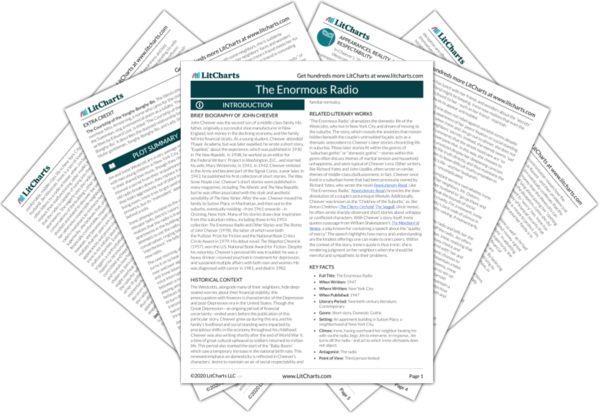The new radio that Jim and Irene Westcott buy comes to represent the power—and danger—of peeking into others’ lives. This radio is a malevolent, chaotic presence; Irene considers it an intruder, and she highlights its ugly and predatory aspects, such as its eerie green light. Soon after the radio’s entrance into their household, Jim and Irene realize that the radio is broadcasting their neighbors’ conversations instead of playing music. Irene is quickly enthralled by the radio’s eavesdropping capabilities, and deliberately uses the radio to invade the privacy of her neighbors. As she discovers hidden truths about the people in her social circle, however, she realizes that most of her acquaintances are concealing terrible secrets in order to maintain their respectability. Additionally, Jim and Irene eventually get into an argument over the radio’s influence; this argument, in turn, reveals the lies and cruel deeds Irene has kept hidden to maintain appearances.
The radio, therefore, provides Irene with knowledge of her neighbors’ darkest secrets and, ultimately, forces her to confront her own hypocrisy and ignorance. Irene initially acts self-righteous and superior when she hears about her neighbors’ struggles, but her newfound knowledge eventually leads to painful realizations about both herself and others. Furthermore, the radio illustrates the inescapability of truth. Despite the Westcotts’ hope to seem normal and untroubled—a hope shared by their neighbors, who act in equally dishonest and insincere ways—the radio eventually reveals the truth about everyone, including its owners.
The Radio Quotes in The Enormous Radio
Irene Westcott was a pleasant, rather plain girl with […] a wide, fine forehead upon which nothing at all had been written […] You could not say that Jim Westcott looked younger than he was, but you could at least say of him that he seemed to feel younger. He […] dressed in the kind of clothes his class had worn at Andover, and his manner was earnest, vehement, and intentionally naïve. The Westcotts differed from their friends, their classmates, and their neighbors only in an interest they shared in serious music. They went to a great many concerts—although they seldom mentioned this to anyone—and they spent a good deal of time listening to the music on the radio.

Unlock explanations and citation info for this and every other The Enormous Radio quote.
Plus so much more...
Get LitCharts A+She was struck at once with the physical ugliness of the large gumwood cabinet. Irene was proud of her living room, she had chosen its furnishings and colors as carefully as she chose her clothes, and now it seemed to her that the new radio stood among her intimate possessions like an aggressive intruder [ … the radio] filled the apartment with the noise of music amplified so mightily that it knocked a china ornament from a table to the floor […] The violent forces that were snared in the ugly gumwood cabinet made her uneasy.
Jim was too tired to make even a pretense of sociability, and there was nothing about the dinner to hold Irene's interest […] She listened for a few minutes to a Chopin prelude and then was surprised to hear a man’s voice break in. “For Christ’s sake, Kathy,” he said, “do you always have to play the piano when I get home?” The music stopped abruptly. “It’s the only chance I have,” a woman said. “I’m at the office all day.” “So am I,” the man said. He added something obscene about an upright piano, and slammed a door. The passionate and melancholy music began again.
“Did you hear that?” Irene asked. […]
“It's probably a play.”
“Those must be the Fullers, in 11-E,” Irene said. “I knew they were giving a party this afternoon. I saw her in the liquor store. Isn't this too divine? Try something else. See if you can get those people in 18-C.”
The Westcotts overheard that evening a monologue on salmon fishing in Canada, a bridge game, running comments on home movies of what had apparently been a fortnight at Sea Island, and a bitter family quarrel about an overdraft at the bank. They turned off their radio at midnight and went to bed, weak with laughter.
Irene shifted the control and invaded the privacy of several breakfast tables. She overheard demonstrations of indigestion, carnal love, abysmal vanity, faith, and despair. Irene's life was nearly as simple and sheltered as it appeared to be, and the forthright and sometimes brutal language that came from the loudspeaker that morning astonished and troubled her. She continued to listen until her maid came in. Then she turned off the radio quietly, since this insight, she realized, was a furtive one.
“I'm sick to death of your apprehensiveness. The radio can't hear us. Nobody can hear us. And what if they can hear us? Who cares? […] Why are you so Christly all of a sudden? […] You stole your mother's jewelry before they probated her will. You never gave your sister a cent of that money that was intended for her—not even when she needed it […] where was all your piety and your virtue when you went to that abortionist? I'll never forget how cool you were.”












